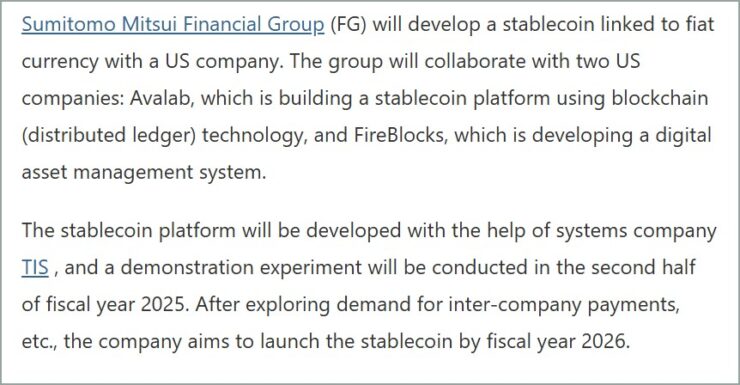Sumitomo Mitsui Financial Group (SMFG), the parent company of Japan’s second-largest bank, SMBC, is preparing to launch a stablecoin project in collaboration with blockchain firm Ava Labs and crypto security provider Fireblocks, according to a report by Nikkei.
Ava Labs, known for developing the Avalanche network, will be tasked with building the foundational blockchain infrastructure for the digital currency. Fireblocks, a prominent digital asset custody and security company, will handle the operational framework for managing the stablecoin once deployed.

In addition, SMFG will partner with Japanese IT firm TIS to conduct technical trials in the second half of 2025. If successful, the group aims to officially issue the stablecoin sometime in 2026. The initiative marks one of the most high-profile blockchain collaborations in Japan’s banking sector to date and signals accelerating efforts by traditional financial institutions to create compliant digital asset ecosystems tailored for the local market.
SMBC Builds on Past Web3 Pilots
SMBC’s latest stablecoin initiative reflects a continuation of its growing engagement with blockchain and Web3 technologies. In 2022, the bank launched Token Business Lab in partnership with local firm HashPort, aimed at exploring enterprise applications for NFTs. That same year, the duo tested the issuance of soulbound tokens—non-transferable digital identifiers designed for use in identity verification systems.
More recently, SMBC revealed plans to collaborate on a cross-border stablecoin pilot with two of Japan’s other banking giants—Mitsubishi UFJ Financial Group and Mizuho Financial Group. The joint effort is designed to address inefficiencies in international settlements, an area where traditional systems like SWIFT remain slow and costly due to layers of intermediaries.
Stablecoins, if deployed at scale, could offer banks a streamlined alternative for global payments—facilitating faster transactions with lower fees and greater transparency. SMBC’s increasing activity in the space suggests a strategic pivot to embed digital currencies directly into the core architecture of its financial services, aligning with broader regional and global trends.
Japan’s Regulatory Head Start Fuels Banking Sector’s Stablecoin Ambitions
Japan continues to be one of the most proactive jurisdictions in providing legal clarity around stablecoins. In June 2022, the Japanese parliament revised the Payment Services Act to formally recognize fiat-pegged digital currencies as “Electronic Payment Instruments.” The framework stipulates that only licensed banks, registered money transfer agents, and trust companies are authorized to issue such tokens—a move designed to ensure consumer protection while encouraging responsible innovation.
This regulatory clarity has created fertile ground for institutions like SMBC to experiment with blockchain-based payment solutions, including stablecoins for both domestic and international use. The bank’s latest collaboration with Ava Labs and Fireblocks builds on these foundational rules and is expected to comply fully with Japan’s regulated digital asset environment.
Meanwhile, the momentum is mirrored across the Pacific. In the U.S., President Donald Trump has repeatedly emphasized the importance of advancing dollar-backed stablecoins, calling on lawmakers to accelerate legislation that would position the U.S. as a leader in regulated digital payments. With the STABLE Act and other pending bills inching closer to the finish line, a wave of traditional financial institutions—both in Asia and the West—appear poised to enter the stablecoin arena.
Quick Facts
- SMBC is developing a stablecoin in partnership with Ava Labs and Fireblocks, with plans to begin technical testing in late 2025.
- Ava Labs will build the blockchain infrastructure, while Fireblocks will manage custody and token operations.
- The project is one of Japan’s most significant bank-led blockchain initiatives to date, aligning with the country’s regulated approach to stablecoins.
- SMBC aims to launch the stablecoin in 2026, pending results from its trials with Japanese IT firm TIS.





